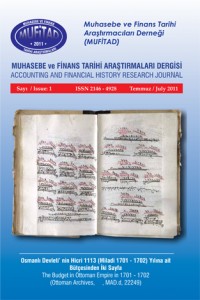Abstract
Türkiye’de Ticaret Kanunları 160 yıllık bir geçmişe sahiptir. İlk kanun 1850 yılında kabul edilmiştir. Bu yasa, 1807 yılında Napolyon zamanında yürürlüğe giren Code Commerce’in birinci ve üçüncü kitaplarının tercüme edilmesinden oluşuyordu. XIX. Yüzyılda Osmanlı’da ticarette şeriat hükümleri geçerli olduğu için fazla uygulama olanağı bulunamayan bu yasal düzenleme, ilk anonim şirketlerin kurulmasında etkin olmuştur. 1926 Yılında yürürlüğe giren Kanun-ı Ticaret, Cumhuriyet devrimlerinin ilk yasal düzenlemelerinden birisidir. Çağdaş sosyal yapıyı oluşturan Türk Medeni Kanunundan sonra yayınlandığı için uygulama olanağı bulmuştur. Üç muhasebe defteri benimsendiği görülmektedir. Bunlar günlük defter, envanter defteri ve ticari yazışmaların kopya edildiği kopya defteridir. Türkiye’de çağdaş muhasebe anlayışının uygulanmasına da öncülük eden bu yasa, 1957 yılında günün koşullarına göre yenilenmiştir. Kopya defteri zorunlu olmaktan çıkarılmış, büyük defter zorunlu defter olarak, günlük deftere ve envanter defterine eklenmiştir. 1850, 1926 ve 1957 yasaları büyük ölçüde Code de Commerce’in etkisi altında düzenlenmiş yasalardır. Son Türk Ticaret Kanunu, 2011 yılının başında yayınlanmış olup, 2012 yılının ortalarında yürürlüğe girecektir. Bu yasal düzenlemenin muhasebe ile ilgili hükümleri iki önemli çağdaş gelişimin etkisi altında düzenlenmiştir. Bunlardan birisi görüntü araçlı belge düzenlemede olduğu gibi teknolojik gelişmelerdir. Öteki de ekonomik globalleşmedir. Bu gelişmenin etkisi, Uluslararası Finansal Raporlama Standartları (UFRS)’na uygun olarak hazırlanan Türkiye Muhasebe Standartları (TMS)’nın muhasebeye egemen duruma gelmesidir. Bu amaçla Türkiye Muhasebe Standartları Kurulu’na geniş yetkiler tanındığı gözlenmektedir.
Abstract
Turkish Commercial Laws have a history of 160 years. The first law was enacted
in 1850. That law was consisted of the translations of the first and the second books of
Code de Commerce. In the 19th Century, Islamic rules were applied in the commercial
life of the Ottoman Empire. Therefore this law couldn’t be applied to the commercial
life. But it had a crucial effect in the establishment stock companies. Kanun-ı Ticaret
of 1926 is considered as one of the first legal regulations of the Republic. It was
applied to the commercial life because it was issued after Turkish Civil Law.
There were three main account books. Those are daily book, stock book and a copy
book for the copies of daily commercial transactions. This law led the way for modern
accounting concepts and it was renewed in 1957 according to the conditions of the
era. Copy book was no longer mandatory. However, keeping a ledger added as a
mandatory book. The laws of 1850, 1926 and 1957 were applied under the influence
of Code De Commerce. The last Turkish Commercial Law was issued in the first days
of 2011 and will be practically applied in July, 2012. The accounting effect of this legal
regulation was issued under the influence of two main events. The first one is about
the technological events. The second one is about the economic globalization. The
effect of economic globalization is the Turkish Accounting Standards (TAS) which were
prepared in accordance with the International Financial Reporting Standards (IFRS).
With this purpose it is observed that broad authority is given to the Turkish Accounting
Standards Board.
Details
| Other ID | JA57DV38TG |
|---|---|
| Journal Section | Articles |
| Authors | |
| Publication Date | July 1, 2011 |
| Published in Issue | Year 2011 Issue: 1 - Issue: 1 |


